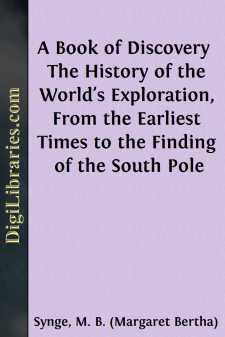Categories
- Antiques & Collectibles 13
- Architecture 36
- Art 48
- Bibles 22
- Biography & Autobiography 813
- Body, Mind & Spirit 141
- Business & Economics 28
- Children's Books 12
- Children's Fiction 9
- Computers 4
- Cooking 94
- Crafts & Hobbies 4
- Drama 346
- Education 46
- Family & Relationships 57
- Fiction 11826
- Games 19
- Gardening 17
- Health & Fitness 34
- History 1377
- House & Home 1
- Humor 147
- Juvenile Fiction 1873
- Juvenile Nonfiction 202
- Language Arts & Disciplines 88
- Law 16
- Literary Collections 686
- Literary Criticism 179
- Mathematics 13
- Medical 41
- Music 40
- Nature 179
- Non-Classifiable 1768
- Performing Arts 7
- Periodicals 1453
- Philosophy 64
- Photography 2
- Poetry 896
- Political Science 203
- Psychology 42
- Reference 154
- Religion 513
- Science 126
- Self-Help 83
- Social Science 81
- Sports & Recreation 34
- Study Aids 3
- Technology & Engineering 59
- Transportation 23
- Travel 463
- True Crime 29
A Book of Discovery The History of the World's Exploration, From the Earliest Times to the Finding of the South Pole
Categories:
Description:
Excerpt
INTRODUCTION
Such was the spirit in which the exploration of the world was accomplished. It was the inspiration that carried men of old far beyond the sunrise into those magic and silent seas whereon no boat had ever sailed. It is the incentive of those to-day with the wander-thirst in their souls, who travel and suffer in the travelling, though there are fewer prizes left to win. But
"To travel hopefully," says Stevenson, "is a better thing than to arrive." This would explain the fact that this Book of Discovery has become a record of splendid endurance, of hardships bravely borne, of silent toil, of courage and resolution unequalled in the annals of mankind, of self-sacrifice unrivalled and faithful lives laid ungrudgingly down. Of the many who went forth, the few only attained. It is of these few that this book tells.
"All these," says the poet in Ecclesiastes—"all these were honoured in their generation, and were the glory of their times ... their name liveth for evermore."
But while we read of those master-spirits who succeeded, let us never forget those who failed to achieve.
Enthusiasm too was the secret of their success. Among the best of crews there was always some one who would have turned back, but the world would never have been explored had it not been for those finer spirits who resolutely went on—even to the death.
This is what carried Alexander the Great to the "earth's utmost verge," that drew Columbus across the trackless Atlantic, that nerved Vasco da Gama to double the Stormy Cape, that induced Magellan to face the dreaded straits now called by his name, that made it possible for men to face without flinching the ice-bound regions of the far North.
"There is no land uninhabitable, nor sea unnavigable," asserted the men of the sixteenth century, when England set herself to take possession of her heritage in the North. Such an heroic temper could overcome all things. But the cost was great, the sufferings intense.
"Having eaten our shoes and saddles boiled with a few wild herbs, we set out to reach the kingdom of gold," says Orellana in 1540.
"We ate biscuit, but in truth it was biscuit no longer, but a powder full of worms,—so great was the want of food, that we were forced to eat the hides with which the mainyard was covered; but we had also to make use of sawdust for food, and rats became a great delicacy," related Magellan, as he led his little ship across the unknown Pacific.
Again, there is Franklin returning from the Arctic coast, and stilling the pangs of hunger with "pieces of singed hide mixed with lichen," varied with "the horns and bones of a dead deer fried with some old shoes."
The dangers of the way were manifold.
For the early explorers had no land map or ocean chart to guide them, there were no lighthouses to warn the strange mariner of dangerous coast and angry surf, no books of travel to relate the weird doings of fierce and inhospitable savages, no tinned foods to prevent the terrible scourge of sailors, scurvy....


